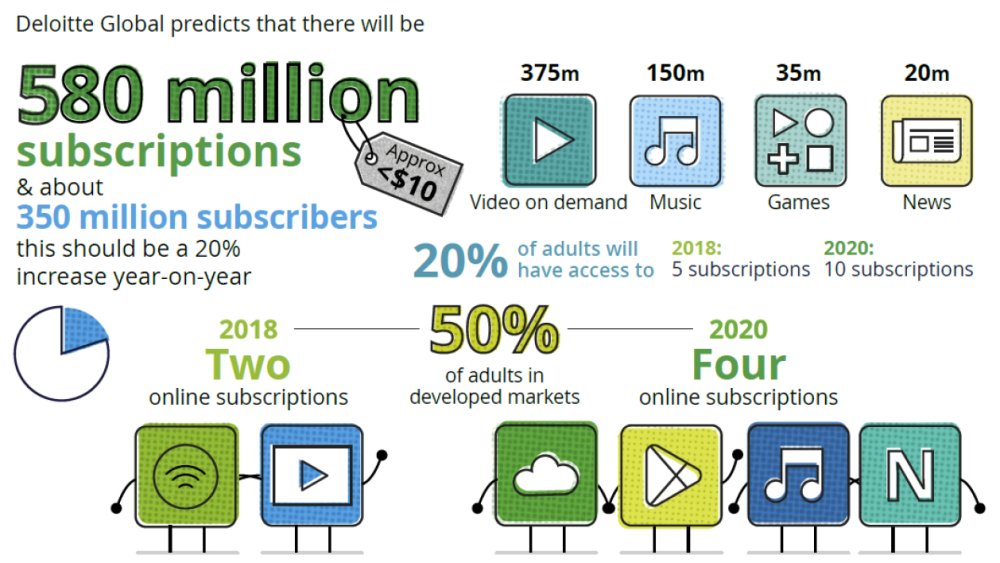 source: Deloitte, TMT Predictions 2018
source: Deloitte, TMT Predictions 2018The TMT Predictions 2018 report by Deloitte experts forecasts that by the end of 2018, half of adults in developed countries will have at least two online media subscriptions, increasing to four by 2020. The cost of these subscriptions, primarily covering television, movies, music, news, and press, will average below $10 per month in 2018. The global subscriber count is projected to reach 350 million people, with 580 million subscriptions, most of which will be VoD (375 million).
Up to 20% of adults in developed countries will subscribe to, or have access to, at least five paid online media subscriptions, and by 2020, this figure could rise to ten.
- "The subscription model has been long known in traditional media, such as print magazine subscriptions. Now, we are witnessing its growing popularity online due to several factors," says Jakub Wróbel, Senior Manager in Deloitte`s Consulting Department. - "The primary drivers are increasingly attractive content available on multiple devices and a growing customer base willing to pay for it."
This trend is also supported by technological advancements and faster internet connections. In Poland, recent years have seen the growth of video services like Netflix, Player.pl, and ShowMax, which also invest in local productions. The trend of "binge-watching," where entire seasons of shows are available at once, allows viewers to spend hours watching on TVs, computers, or phones without interruption.
According to Deloitte’s research, this trend is especially prevalent among millennials, where:
- 90% admit to binge-watching,
- and 38% do so regularly (data from U.S. viewers).
- "As this trend continues, content providers and advertisers will look for ways to leverage it to better reach customers. At the same time, we can expect an increase in content suitable for binge-watching," comments Jakub Wróbel.
The End of Advertising in Media? A Bold Prediction
According to the authors of the "TMT Predictions 2018" report, as media reach increases, revenue per reader, viewer, ad impression, or click is decreasing. Deloitte experts emphasize that, in this situation, some publishers see attempts to generate revenue from online advertising as a waste of time. Consequently, content creators may focus on increasing subscription revenues and creating more varied, audience-specific subscription packages.
This shift is supported by research on ad-blocking trends. Deloitte experts estimate that, by 2018, 10% of adults in North America will engage in at least four simultaneous ad-blocking actions on computers and mobile devices, reflecting a condition known as “ad-phobia.”
Data from 2017 published by Page Fair reveals that:
- Ad-blocking software is installed on 615 million devices worldwide
- 11% of global internet users block ads
- Global ad-block usage increased by 30% in one year
In Poland, ad-block usage reached 33% among internet users in 2017, placing Polish users among the highest in the world for ad-block adoption.
COMMERCIAL BREAK
New articles in section Media industry
Tags, hashtags and links in video descriptions. Youtube SEO after Gemini AI update [ANALYSIS]
BARD
Once, positioning a video on Youtube was simple. It was enough to stuff the description with keywords and wait for results. Those days are not coming back. In 2026, the algorithm is no longer a simple search engine that connects dots. It is the powerful Gemini AI artificial intelligence that understands your video better than you do.
Freelancers 2025 in media and advertising. Useme report
Krzysztof Fiedorek
The modern media and communication market presents entirely new challenges for independent creators. Traditional services are giving way to more complex forms of messaging. The most popular industries in which Polish freelancers operate focus on companies' online presence and visual content.
Video content in Poland. What and how we watch
Paweł Sobczak
Video content is watched remotely, but streaming services are mainly enjoyed in the comfort of home. This is how the consumption of audiovisual content by Poles in 2025 can be summarized. This is the result of an analysis of a study conducted by SW Research and data from the company MEGOGO.
See articles on a similar topic:
Books, e-books and audiobooks about the media and for journalists [LINK]
AUTOPROMOCJA Reporterzy.info
Thanks to cooperation with the Amazon, we may suggest you wide offer of great reading opportunity. Studies on the history and media market, interviews, reports and photo guides. Ordering and delivering a book now only takes a few moments. We invite you for a good lecture!
Trust in Public Media in Europe. Report by European Broadcasting Union
Krzysztof Fiedorek
Public media in Europe play a significant role in fostering trust and supporting democracy. The EBU 2024 report examines leaders, major challenges, and the impact of media on society. Polish, Hungarian, and Greek media, with results far below the average, face a crucial question: can trust be rebuilt?
Radio Listenership in Poland 2024: Demographics, Trends, and Statistics
Krzysztof Fiedorek
Why do millions of Poles still choose radio? What drives RMF FM's dominance and Eska's surprising results? The latest "Audio Track" report from the National Media Institute reveals listenership data, demographics, and evolving trends. How does the digital revolution affect traditional stations?
Social Media and Relationships. Interesting Research from Palestine
KFi
What does love look like in the digital age? Does technology bring people closer or push them apart? In an era where Facebook and Instagram replace dinner table conversations, social media has become a new space for marital relationships. Researchers from An-Najah National University examined how technology can build bonds but also sow uncertainty.






























